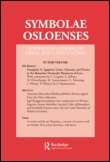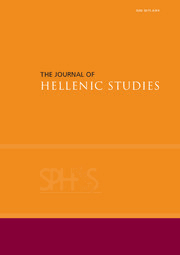
AMERICAN JOURNAL OF PHILOLOGY
metrics 2024
Cultivating Critical Thought in Literature and Language
Introduction
The American Journal of Philology is a premier scholarly publication dedicated to the field of classics, literature, cultural studies, and linguistics. Published by Johns Hopkins University Press, this esteemed journal boasts an impressive reputation, reflected in its high impact factor and robust rankings—achieving a prestigious Q1 classification in Classics and Literary Theory, while securing a Q2 in Cultural Studies and Linguistics for 2023. The journal provides a rigorous platform for original research, critical essays, and innovative inquiries, contributing significantly to contemporary discourse in the humanities. Its comprehensive scope encompasses interdisciplinary studies, making it a vital resource for researchers, professionals, and students alike. Although it does not operate under an open-access model, the journal ensures that its content remains accessible to a wide audience through institutional subscriptions. With a publication history dating from 1972 to the present, the American Journal of Philology continues to be pivotal in fostering academic excellence and enriching the understanding of philological studies.
Metrics 2024
 0.21
0.21 0.60
0.60 0.70
0.70 28
28Metrics History
Rank 2024
Scopus
JCI (Web Of Science)
Quartile History
Similar Journals

Symbolae Osloenses
Unveiling the Legacy of Ancient CulturesSymbolae Osloenses, published by TAYLOR & FRANCIS LTD, is a distinguished journal in the field of Classics, with a rich history dating back to its inception in 1922. This UK-based journal has continuously contributed to the scholarly discourse surrounding ancient cultures, languages, and literature, making it a crucial resource for researchers, educators, and students alike. Though it operates under a subscription model, its impact on the academic community is underscored by its recent inclusion in the 2023 Scopus rankings, where it holds a respectable position in the 65th percentile among its peers. With decades of published research spanning from 1924 to 2023, Symbolae Osloenses remains committed to fostering robust academic dialogue and advancing knowledge in the Classics, catering to a diverse readership seeking to explore the nuances of classical studies.

GLOTTA-ZEITSCHRIFT FUR GRIECHISCHE UND LATEINISCHE SPRACHE
Championing Excellence in Classical ScholarshipGLOTTA-ZEITSCHRIFT FUR GRIECHISCHE UND LATEINISCHE SPRACHE, published by Vandenhoeck & Ruprecht GmbH & Co KG, stands as a pivotal academic journal within the field of Classics and Linguistics, demonstrating a strong commitment to advancing scholarly discourse surrounding the Greek and Latin languages. With a respectable Scopus ranking placing it in the top 77th percentile for Classics, this journal facilitates the dissemination of high-quality research and insights relevant to linguists, philologists, and historians alike. The journal operates without an open access model, ensuring its niche scholarship remains exclusive yet profoundly impactful. The HIndex is indicative of its longstanding influence, with the journal traces its roots back to its inception, with weighted contributions across several pivotal years. Furthermore, the journal's current standing—positioned in the Q2 quartile for Classics and Q3 quartile for Linguistics—reflects its thriving relevance and aspiration towards academic excellence, offering a significant platform for the exchange of ideas within the global scholarly community. Researchers, professionals, and students are encouraged to engage with the journal's contributions, as it consistently reflects the evolving dialogue in the study of ancient languages.

Exemplaria Classica
Illuminating the Enduring Legacy of the ClassicsExemplaria Classica, published by Universidad de Huelva's Servicio de Publicaciones, is a prominent academic journal dedicated to the fields of Classics and Literature and Literary Theory. Established in 2011, this journal serves as a vital resource for scholars, educators, and students interested in the rich tapestry of classical literature and its enduring influence on contemporary thought. With an ISSN of 1699-3225 and an E-ISSN of 2173-6839, it has firmly established itself in the academic community, although it currently holds a Q4 ranking in both its categories. The journal is ranked #712 out of 1106 in Literature and Literary Theory and #129 out of 170 in Classics as per Scopus rankings, reflecting its emerging status in these fields. Despite its open access designation being currently unclear, Exemplaria Classica is essential for advancing discussions and research in classical studies and has covered a diverse range of topics over its publishing years, making it an important addition to any academic library.

Eirene-Studia Graeca et Latina
Fostering Scholarly Inquiry into AntiquityEirene-Studia Graeca et Latina, ISSN 0046-1628, is a prominent academic journal published by the Institute of Classical Studies, Academy of Sciences of the Czech Republic. Focusing on the fields of Classics, Linguistics, and Archaeology, this journal serves as a vital platform for scholarly discourse and research dissemination since its inception in 2002. Although it operates under a traditional access model, the journal has established itself within the academic community, evidenced by its placement in the Q4 category across multiple disciplines in 2023. This includes significant rankings in areas such as Archaeology and Language and Linguistics, where it finds itself within the 27th to 16th percentiles of its respective categories. Eirene aims to foster the advancement of research in the Humanities, providing a rigorous forum for scholars and practitioners interested in classical studies. Its contribution to the academic landscape is essential for those who aspire to explore the depths of ancient languages, cultures, and methodologies, making it a valuable resource for researchers, professionals, and students alike.

MNEMOSYNE
Elevating academic dialogue in literature and linguistics.MNEMOSYNE is a prestigious academic journal published by BRILL, specializing in the fields of Archeology, Classics, History, Linguistics and Language, and Literature and Literary Theory. With a remarkable history dating back to its inception in 1948, this journal continues to be a crucial resource for scholars and researchers, spanning its publication years that extend to 2024. The journal boasts high rankings in multiple categories according to Scopus, including Q1 status in Classics and History, reflecting its impact and relevance in the academic community. Although it is not an Open Access journal, its selection of peer-reviewed articles ensures rigorous scholarship that contributes to ongoing discussions and discoveries in the humanities. By providing a platform for innovative research and critical discourse, MNEMOSYNE plays an integral role in advancing the understanding of cultural and historical contexts, making it an essential read for both seasoned academics and emerging scholars alike.

Rivista di Filologia e di Istruzione Classica
Exploring the Depths of Classical Thought and LanguageRivista di Filologia e di Istruzione Classica is a distinguished academic journal published by LOESCHER EDITORE, dedicated to advancing the fields of Classics and Linguistics. Based in Italy, this journal serves as a vital platform for original research, critical analysis, and scholarly discussions that enrich our understanding of classical texts and educational methodologies in the humanities. With its unique focus on the intricate relationship between classical literature and language, the journal aims to facilitate discourse among researchers, educators, and students alike. Although categorized in the fourth quartile in both Classics and Linguistics, it provides an essential venue for scholars seeking to disseminate their findings and engage with contemporary academic debates. The journal is indexed in various databases, though recent coverage in Scopus has been discontinued. Researchers interested in exploring the complex layers of classical philology and instructional practices are encouraged to contribute to and engage with the innovative scholarship presented in this journal.

JOURNAL OF HELLENIC STUDIES
Unveiling the Rich Tapestry of Hellenic CultureThe Journal of Hellenic Studies, published by Cambridge University Press, is a prestigious academic journal dedicated to the exploration and analysis of ancient Greek culture, history, and languages. Established in 1880, the journal has evolved continuously to serve a dynamic scholarly community, covering significant fields such as Classics, Literature, and Archaeology, among others. With an impressive impact factor that highlights its scholarly influence, it ranks in the top quartiles (Q1) for Classics and Literature and Literary Theory, as well as maintaining strong positions in other relevant disciplines. The Journal of Hellenic Studies provides researchers, professionals, and students an excellent platform to disseminate new findings and engage with contemporary debates. Although it does not offer open access, its contributions are accessible through institutional subscriptions, ensuring that critical research remains at the forefront of academic discussions on Hellenic studies.

Eikasmos-Quaderni Bolognesi di Filologia Classica
Exploring the Depths of Classical PhilologyEikasmos-Quaderni Bolognesi di Filologia Classica is a distinguished journal that focuses on the fields of Classics, Linguistics, and Language, published by PATRON EDITORE S R L in Italy. With its ISSN 1121-8819, the journal has been a vital platform for the dissemination of scholarly work from 2011 until 2021, contributing significantly to the dialogue within these disciplines. Although recognized in the lower quartiles (Q4) of various categories within Scopus, including Classics and Linguistics, and having ranked in the 37th and 19th percentiles respectively, Eikasmos stands as an invaluable resource for researchers, academics, and students committed to exploring classical philology and its interconnections with modern linguistic studies. The absence of an open access model underscores the importance of institutional support in accessing this scholarly work, which continues to enrich the academic landscape of classical studies.

QUADERNI URBINATI DI CULTURA CLASSICA
Illuminating the Classics through Rigorous AnalysisQUADERNI URBINATI DI CULTURA CLASSICA is a distinguished academic journal dedicated to the interdisciplinary exploration of Classics, Linguistics, and Literary Theory. Published by ACCADEMIA EDITORIALE PISA-ROMA, this journal serves as a vital scholarly platform for researchers and professionals alike, facilitating in-depth discussions and analyses that contribute to these evolving fields. With an ISSN of 0033-4987 and an E-ISSN of 1724-1901, it boasts a robust Scopus ranking, placing it within the second quartile in Classics and the third quartile in related disciplines as of 2023. Although it is not an open-access journal, QUADERNI URBINATI DI CULTURA CLASSICA remains essential for those engaged in the study of language, literature, and classical cultures, encouraging scholarly exchange and innovation from its base in Rome, Italy. Researchers and students will find valuable insights and methodologies within its pages, making it a key resource for fostering academic growth and understanding.

Materiali e Discussioni per l Analisi dei Testi Classici
Cultivating a Dialogue on Literary HeritageMateriali e Discussioni per l'Analisi dei Testi Classici is a distinguished academic journal published by Fabrizio Serra Editore that focuses on the rich field of Classics and Literature, serving as a vital platform for scholarly discourse and research. Featuring ISSN 0392-6338 and E-ISSN 1724-1693, this journal has been actively publishing since 2009, with a dedicated effort to analyze classical texts and foster critical discussions among academics and students alike. Although the journal operates without an open access model, it is recognized for its significant contributions, evidenced by its ranking in the third quartile (Q3) in both the Classics and Literature categories as of 2023. This places it among the notable outlets for literary and classical scholarship, with Scopus ranks highlighting its ongoing influence in these fields. Based in the heart of Italy, in Pisa, the journal not only enriches the academic community but also provides an essential resource for those engaged in the profound study of classical literature, inviting contributions that challenge and expand current knowledge and methodologies.